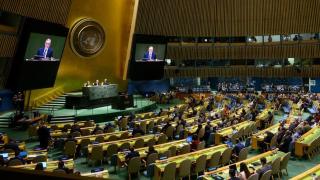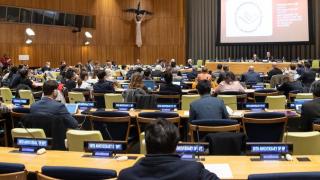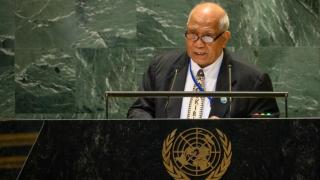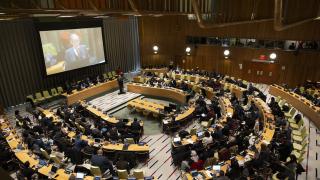
In a recent letter to UNA-UK, the UK Government has reasserted its divisive position on the UN Treaty on the Prohibition of Nuclear Weapons (TPNW), also known as the ‘Ban Treaty’, writing that it “will not advance disarmament and risks undermining international non-proliferation work and the Non-Proliferation Treaty (NPT)”.
UNA-UK has repeatedly made the case that adopting such a stance and tone is needlessly divisive and ignores the legitimate concerns of the majority of international community advocating urgent tangible progress on disarmament. The UK’s reassertion is also at odds with the recent Lord Select Committee on International Relations report, which we were pleased to see included the recommendation for the UK to adopt a “less aggressive” tone towards the TPNW.
The five nuclear weapons states recognised under the NPT (N5) - China, France, Russia, the US and the UK - are placed under an obligation by Article 6 of the NPT to make good faith attempts to move towards the eventual abolition of their nuclear weapons programmes. The TPNW, pursued by non-nuclear weapons states and civil society and adopted in 2017, was in part a response to the perceived failure by the N5 to live up to this obligation.
The Committee's report, which cites UNA-UK's submitted evidence a number of times, also recommends that the Government look for opportunities to “work with [the TPNW’s] supporters towards the aims of Article 6 of the Nuclear Non-Proliferation Treaty” – showing that, in the Committees’ eyes, there is a level of compatibility between supporting the TPNW and fulfilling disarmament obligations under the NPT. It is therefore disappointing that, far from recognising this, the UK still casts the TPNW as a risk to the NPT – an approach that closes down an avenue of rapprochement and productive debate with non-nuclear weapons states and therefore renders the UK itself guilty of the very thing it accuses TPNW supporters of doing: risking undermining the NPT.
From UNA-UK's evidence to the IR Committee's inquiry:
The UK’s labelling of the TPNW as a divisive initiative will itself serve to deepen divisions and make it harder to reach consensus agreements on nuclear security in other multilateral forums, such as the NPT. It demonstrates a blindness to the fact that the TPNW arose as a consequence of a perceived N5 failure to uphold their Article 6 commitments. Therefore, a continued dismissive approach to the ban treaty appears to be inconsistent with the UK’s strategic objectives. Such an approach is also unequivocally at odds with UN guidance on the issue. A statement made by UN High Representative on Disarmament Affairs, speaking in UK Parliament in February 2018, implored the N5 to desist from attacking the TPNW, saying: “don’t ignore it, don’t attack it.
2020 and the need to bridge the nuclear weapons divide
With states withdrawing from multiple security frameworks and the apparent emergence of a new nuclear arms race, risks are rising. Next year will be a key test for international cooperation on nuclear issues as states consider how to approach the NPT Review Conference – a five-yearly occasion to make commitments towards the Treaty’s implementation, with the ultimate goal of a world free of nuclear weapons. If, like in 2015, the Review Conference fails to agree an action plan, it will represent a further drying up of international cooperation and the demise - at least for the short to medium-term - of the centrepiece of the nuclear non-proliferation and disarmament architecture.
A key issue which increases the likelihood of failure is the growing loss of faith in the sincerity of the nuclear-armed states’ commitment to work constructively on disarmament – a sentiment which will likely be exacerbated by the continued casting of the TPNW as a risk to non-proliferation, by the UK (and other nuclear weapons states). The UK’s divisive position will also stunt the modest but positive steps taken at the 2019 NPT preparatory meeting, which saw the UK release a draft National Report on implementation and hold discussions with advocates of the TPNW.
As outlined in our evidence to the Lords IR Committee, if the UK can show some leadership and (1) modify its approach to the TPNW and (2) signal tangible progress on nuclear disarmament initiatives, opportunities remain for UK action to improve the chances of success of the Review Conference:
(1) The UK should adopt a constructive approach towards the TPNW and acknowledge it as a legitimate part of the rules-based international system. Within this approach, the UK should:
- Announce the intention to attend any future Meeting of States Parties of the TPNW as an observer, to follow developments and avoid misconceptions;
- Provide technical expertise and other input within the TPNW framework where relevant, for example on: discussions of verification issues that will take place and on which the UK continues to do substantial work; and on activities to address ongoing human and environmental harm from past nuclear testing;
- Until such time that it becomes a State Party of the TPNW, voluntarily implement Article 6 of the TPNW on victim assistance and environmental remediation and publish details of actions taken;
- Foster a dialogue with countries and organisations working on the TPNW on how the Treaty can make an effective contribution to disarmament, including through making a positive, reinforcing impact on the disarmament pillar of the NPT
(2) The UK should make concrete progress on its Article 6 NPT commitment to by taking unilateral steps to disarm including the following which compatible with the manifesto commitments of all major UK political parties, inter alia:
- Explore further reductions in overall numbers of nuclear warheads;
- Adopt unambiguous polity of no first use;
- Strengthen negative security assurances to states without nuclear weapons;
- Plan for a denuclearised UK security policy by instructing the MOD to make alternative security arrangements that would allow the UK at some point in the future to transition to a nuclear-free national security strategy.
The upcoming high-level event at the UN General Assembly to mark the International Day for the Total Elimination of Nuclear Weapons provides an excellent opportunity for the UK to signal progress on this crucial issue (read our UNGA briefing here). UNA-UK will continue to advocate for these recommendations and stands ready to work constructively and pragmatically with the UK in support of nuclear disarmament and cooperation.
- Read UNA-UK’s evidence to the Lords IR Committee inquiry
- Read the Lords IR Committee’s report
- Read the Government’s response to the Committee's report
- Read UNA-UK's subsequent advocacy letter to the Government
- Read the Government’s reply to UNA-UK's letter
Image: Photo used by the UN to promote the International Day for the Total Elimination of Nuclear Weapons. The image shows St. George slaying a dragon created from fragments of Soviet SS-20 and United States Pershing nuclear missiles. (c) UN Photo/Milton Grant






